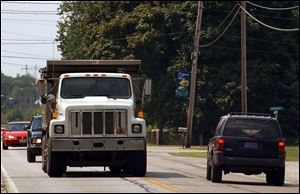
Trucks divert coal from rail to resupply Toledo Edison
8/10/2004
Thanks to rail congestion, motorists in Oregon must share the streets with a growing number of coal-hauling trucks.
Railroad congestion in the western United States is putting coal trucks on the road in suburban Toledo.
Toledo Edison Co. has arranged to have at least 60,000 tons of coal for its Bayshore Generating Station in Oregon delivered to the Port of Toledo by lake freighter, then it will make the last few miles of its journey from Wyoming or Montana mines by truck.
The first wave of coal trucks began running yesterday from Toledo's general cargo docks to the power plant on a route that takes them past Mike Rohm's Bay Shore Road home.
"There's already too much trucking on this road," Mr. Rohm said yesterday. "This just adds insult to injury."
Neighbor Todd Reynolds said the only consolation is that the coal trucks are supposed to be a temporary measure. He said the truck traffic appeared to be mild.
Mark Durbin, a spokesman for Toledo Edison's parent company, FirstEnergy Corp., said the boat-truck connection was a precautionary move because the coal stockpile at the plant was dwindling, and the utility was uncertain that its supply could be met by normal means.
"There is general rail congestion, and a shortage of locomotives," he said. "We are still getting some shipments by rail. We just want to make sure the coal gets in here."
The first of two 30,000-ton
shipments arrived at the Toledo dock last week, and Mr. Durbin said it will take more than a week to truck it all to the power plant. Another boatload is scheduled to arrive Aug. 24, said Brian Schwartz, a Toledo-Lucas County Port Authority spokesman.
Oregon Mayor Marge Brown said the coal traffic was discussed at a public meeting last week. She said she stressed to Toledo Edison officials that the coal trucks' loads must be covered with tarps, their drivers must respect the speed limits, and she has directed particular police attention to the area.
"We will handle complaints when we get them," she said.
For several years, the Bayshore plant's fuel supply has come from the Powder River Basin, a coal seam that extends from northeastern Wyoming into southeastern Montana and is preferred because it is low in sulfur, a key pollutant that causes acid rain.
The cost of transporting this coal to power plants discouraged its use until the 1970s, when clean-air regulations started making it a low-cost alternative to installing costly sulfur-control devices in their smokestacks.
The Norfolk Southern railroad has exclusive delivery access to the Bayshore plant, and typically hauls the coal from western railroad connections at Chicago.
Rudy Husband, a Norfolk Southern spokesman, said his company was having no problems delivering Toledo Edison shipments in a timely manner, but said the coal-car unloading equipment at Bayshore is relatively slow, compared to other plants.
Officials at Burlington Northern & Santa Fe, the railroad that handles the west end of Toledo Edison's shipments, could not be reached for comment.
Widely reported congestion on two other railroads, CSX and Union Pacific, has created freight-car shortages.
Many Great Lakes power plants have facilities to receive coal by rail and water, and for those plants waterborne shipments are transferred from train to boat at a terminal in Superior, Wis., at the head of Lake Superior. Toledo Edison's boat shipments are being transferred there, too, but the dock channel at Bayshore has not been used for many years and would need substantial dredging before direct deliveries could resume.
Mr. Durbin said FirstEnergy sees no need to restore the Bayshore channel at this time, as most of the time rail service is sufficient to provide for the plant's needs.
"This is something that we don't do very often," he said. Mr. Durban estimates that Toledo Edison last supplemented Bayshore's coal supply with boat-truck deliveries "two or three years ago."
Contact David Patch at:
dpatch@theblade.com
or 419-724-6094.